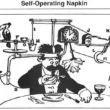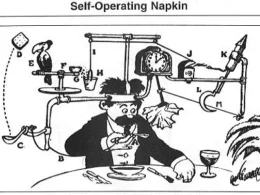More than two years ago, Patrick Byrne, the future Deep Capture reporter, had dinner with an editor of one of the nation’s most important newspapers. The editor said, “I know the media has not been fair to you on the naked short selling issue. Would you like to write an editorial?”
Patrick said, “Sure, but it won’t get published.”
The editor said, “I decide what gets published.”
Patrick wrote the editorial. A day after he submitted it, the editor, known to be a gentleman, called Patrick and said, “I am terribly embarrassed to have to tell you this, but it appears that I will not be able to publish your editorial – or, for that matter, anything else written by you.”
Other publications seemed to have a similar attitude, so Patrick put his editorial in a drawer.
But he didn’t shut up about naked short selling. He said that this problem would eventually crash the financial system. He lambasted the media for failing to cover it.
The media did not listen. Influential journalists, I am embarrassed to tell you, went out of their way to silence or ridicule people who said naked short selling was a problem.
Well, now that Wall Street has suffered the biggest calamity since the Great Depression, almost everyone agrees that naked short selling is a problem. John McCain, Hillary Clinton, the Chairman of the SEC, the Secretary of the Treasury, and the CEOs of some of the very investment banks that have long participated in naked short selling – they all said last week that this crime must be stopped, or the financial system is toast.
So, just for kicks, Patrick dusted off his editorial.
This time, it was published – by Forbes.com.
Too late now, perhaps. But, please, read this editorial. Read it because it is so simple. Read it because you will see what some of our most sophisticated financial journalists failed, or refused, to grasp.
Read it because the media could not, or would not, and this says something very important about the quality of our public discourse.








A critical – and radical – component of the bailout package proposed by the Bush administration has thus far failed to garner the serious attention of anyone in the press. Section 8 (which ironically reminds one of the popular name of the portion of the 1937 Housing Act that paved the way for subsidized affordable housing ) of this legislation is just a single sentence of thirty-two words, but it represents a significant consolidation of power and an abdication of oversight authority that’s so flat-out astounding that it ought to set one’s hair on fire. It reads, in its entirety:
Decisions by the Secretary pursuant to the authority of this Act are non-reviewable and committed to agency discretion, and may not be reviewed by any court of law or any administrative agency.
Can you provide a link, Baron?
No surprise that Secretary Palpatine allows this mess to fester and grow on his watch and now is reaching for unlimited power.
GOOGLE PHRASE: Decisions by the Secretary pursuant to the authority of this Act are non-reviewable and committed to agency discretion, and may not be reviewed by any court of law or any administrative agency.
http://www.google.com/search?sourceid=navclient&ie=UTF-8&rlz=1T4ADBR_enUS271US271&q=Decisions+by+the+Secretary+pursuant+to+the+authority+of+this+Act+are+non%2dreviewable+and+committed+to+agency+discretion%2c+and+may+not+be+reviewed+by+any+court+of+law+or+any+administrative+agency%2e
http://www.huffingtonpost.com/2008/09/22/dirty-secret-of-the-bailo_n_128294.html
Too Little Too Late.
http://www.youtube.com/watch?v=jYxTzDFofZQ
If employees from BlackRock have recently been subpoenaed for questionable shorting practices, why is Larry Fink, the BlackRock cappo, being proposed as the “gatekeeper” of the proposed $700 billion bailout?
Is there a journalist out there who can shed some light??
How about requiring the DTCC to clear up the failure to delivers on all of the companies on the Reg SHO list instead of protecting all of the financial institutions who are to blame for this mess. It is unbelievable. Keep up the good work Patrick.
SEC Presses Hedge Funds
SEPTEMBER 25, 2008
By KARA SCANNELL
http://online.wsj.com/article/SB122230230724873499.html?mod=testMod
WASHINGTON — The Securities and Exchange Commission ordered more than two dozen hedge funds to turn over trading information as it ramps up its investigation into whether traders were spreading rumors to manipulate shares, according to people familiar with the matter.
The order, dated Sept. 22, identifies six financial institutions the SEC believes may have been subject to such manipulation. The order is akin to a subpoena and requires information to be handed over with a sworn statement attesting to its accuracy. It seeks a wide range of trading data and email communications over a period of three weeks involving American International Group Inc., Goldman Sachs Group Inc., Lehman Brothers Holdings Inc., Morgan Stanley, Washington Mutual Inc. and Merrill Lynch & Co., according to the order, which has been viewed by The Wall Street Journal.
The broad investigation, which was announced Friday, is part of an effort to crack down on rumor mongering and abusive short selling, which some believe contributed to the collapse of Bear Stearns.
Earlier this year, the SEC sent subpoenas to more than 50 hedge funds looking at whether they were spreading rumors about Lehman Brothers, including apparently false information about takeover talks and the possibility of government financing.
In a regular short sale, a trader sells borrowed stock in hopes that it drops and can be bought at a lower price. Under SEC rules, a trader needs to locate stock to borrow ahead of a short sale, and the stock needs to be delivered within three trading days.
Concerns about abusive short sales increased leading up to Lehman Brothers’ bankruptcy filing and moves by other financial companies to seek cash infusions or merger partners. The SEC took the extraordinary step last week of temporarily banning short selling in stocks of financial companies. About the same time, it announced an investigation into credit-default swaps, complex instruments akin to insurance contracts.
The order requested detailed and extensive information about transactions conducted between Sept. 1 and Sept. 19, when certain financial markets came close to freezing up, threatening the broader economy. The requests include details of funds’ positions in stocks, derivatives, swaps and other financial instruments, as well as when trades were initiated and settled and whom they involved.
The SEC is trying to determine whether any traders were involved in abusive short selling, in which numerous short positions were placed at once and the stock was never borrowed and the position never covered. That method can have the effect of putting extra selling pressure on stock prices. The subpoenas are seeking proof that firms located and borrowed shares ahead of the short sales.
The SEC also is seeking detailed information about rumors or other information received by the funds and how it was communicated. Hedge funds also have to turn over information if they forwarded a message to anyone.
Write to Kara Scannell at [email protected]
http://online.wsj.com/article/SB122230230724873499.html?mod=testMod
I think your main problem is that you can’t bring up “naked short selling” without inviting critique of short selling as a whole. The massive short positions that we see today were taken to hedge risks. The problem is that short selling strategies tend to externalizes risks onto shareholders at large while concentrating benefits on a few.
Short selling, both the naked and fully clothed type, clearly made this 2008 market dip deeper. Allowing people to sell things that don’t exist create a system that heaps tons of benefits onto insiders with the brokerage firms while saddling the rest of the market with systemic risks.
I doubt we could ever end up with a regulatory regime that just prevents short selling. If the debate ever started we would either end up with all shorts prevented or no rules on shorting.
Time has come for nominating Deepcapture article by Mark for Pulitzer prize. He deserves it. Will he accept the award?
And Patrick for CEO of the year. Not good enough. President’s medal of honor? Any ideas?
KD, I never use the phrase “naked short selling” for that very reason. They are phantom shares and can be created without any shorting. The prime brokerages, for example, create phantom shares when they net their obligations to each other treating the cash value as one fungible mass. In that case, there was no trade and no shorting.
Did you know that the SEC considers a futures contract to buy as a long position? So if I lend you shares by the technique of selling them to you and buying them back at a set price in the future (repurchase agreement), then both you and I are both long and we’ve doubled the number of shares I had.
Like the magician trying to divert your attention, the phrase naked short selling diverts everyone from the ridiculous notion that the DTCC can’t tell the difference between and IOU and a share and let’s the two trade side by side, making a mockery of corporate elections and massively diluting the values of our portfolios, starving companies of investments.
In this age of computers, it is beyond ridiculous that phantom obligations trade as if they are real shares.
Shame on you DTCC.
Look at number 18th most censored story of 2006.
http://www.projectcensored.org/top-stories/category/y-2006/
18. Little Known Stock Fraud Could Weaken U.S. Economy
in Top 25 Censored Stories for 2006
Sources: San Antonio Express News, March 2, 2005, Title: “Naked Short Selling Is A Plague For Businesses And Investors,” Author: David Hendricks; TheMotleyFool.com, March 30, 2005, Title: “Who’s Behind Naked Shorting?,” Author: Karl Thiel; Financial Wire, Stockgate Today Series, Title: “SEC’s Donaldson Addresses Liquidity Fraud,” September 20, 2004; “Dateline NBC Cancelled and Attorney Accuses DTCC of Cheap Thuggery,” April 7, 2005, Author: Dave Patch
Faculty Evaluator: Wingham Liddell, Ph.D.
Student Researcher: David Stolowitz
The negligence of government regulatory agencies and the media is becoming worrisome as a major scandal, unknown outside the financial community, is bankrupting small businesses and investors and having a negative effect on the economy.
While the balance of supply and demand is a fairly well known principle of economic health, a related and similar relationship exists between liquidity-the availability of liquid, spendable assets such as cash, stocks and bonds-and security-the stability, endurance and trustworthiness of more long-term financial mechanisms.
A healthy economy requires both enough access to liquid assets to ensure a smooth and flexible flow of money and a system that guarantees enough stability, protection and security for investors to take a reasonable measure of risk without having excessive fears of losing their money. Unreasonable emphasis on the first requirement and not enough attention to the second is a trend that has developed in the last decade and may have more to do with ideology than sound economic policy. Liquidity fraud and naked shorting abuses as described in this article are a symptom of a greater problem within our economic culture. This lopsided philosophy of economic regulation is a significant factor in creating the kind of climate that has produced company scandals like Enron and WorldCom, as well as a careless attitude towards free trade and globalization that may create more costs than benefits in the name of “economic growth.”
The scandal coined “Stockgate” by the Financial Wire involves the abuse of a practice called “short selling.” As opposed to a traditional approach to investing in which stocks are researched and bought on the hope they will rise over the “long” term, going “short” involves a bet that a stock is about to go down in value. In a short sale, an investor sells stock that he or she technically doesn’t own. The investor borrows these shares of stock from their broker, who in turn may likely borrow the shares himself from a financial clearinghouse like a brokerage firm or hedge fund. Hoping that the price of the stock will drop, the investor is obligated to eventually “close” the short by buying back the sold shares at a hopefully lower price, thus making a profit from the fall of the stock. When the time runs out for “covering” the short and the price hasn’t dropped, the investor is forced to buy back the shares at a loss and take a financial hit. The short sale of stocks is a risky bet, usually not recommended except for speculation or hedging-to protect long-term financial positions with short-term offsets. As short-selling is a sale of stocks not owned, but loaned, it is an example of buying on margin-a category of practices whose abuses stand out clearly in many people’s minds as a significant factor in the Stock Market Crash of 1929 which ushered in the Great Depression.
Naked shorting is an illegal abuse of short selling in which investors short-sell stock that they have no intention or ability to ever cover. When allowed to occur, naked shorting drives the stock value of a company down by creating more stock shares flowing around the market than actual shares of stock that the company can back with their current earnings. Companies, their shareholders, and indeed the entire economy are hurt financially by naked shorting, as it reduces the money available to support economic growth. According to activist Dave Patch, “Naked shorting steals some of the greatest ideas, products, and services in America. Small micro-cap companies are driven out of business by this abuse and we are left with the unknowns of what these companies and their employees had to offer our futures. The opportunities for the next Microsoft may never be felt as naked shorting snuffed out that creativity before it was ever brought to fruition. Ultimately, naked shorting steals from the very foundation of our nation as it steals the American dream of opportunity.”
Patch and other investors hurt by or concerned about the consequences of naked shorting organized, petitioned and investigated the background surrounding the Stockgate scandal. What they found was not merely a series of noteworthy cases of extravagant abuse by individual investors and professionals, but a systemic pattern of negligence by regulators that allowed the abuse to go by largely unchecked. A whole series of checks and balances was originally designed to prevent abuses like naked shorting. Yet, as their research has shown, every regulator along the way has failed its duty and led to both widespread and high-figure abuse. While investors have lost hundreds of billions of dollars in savings, the Wall Street Firms responsible for the abuse saw negligible fines that had no appreciable impact on their stock values. Some executives were even given raises in the midst of their negligence and fraud!
As more pressure has been brought against regulatory agencies to stop the fraud and enforce rules, an opposition has come forth that actually favors allowing the illegal practice to continue unchecked. These critics argue that all short sales, including illegal naked shorts, help bust the hype that can surround micro-cap companies. Excitement over new but untried ideas can artificially inflate stock prices, causing eventual losses to companies and investors when the bubble bursts, as in the case of the dot-com boom of the ‘90s.
While it is true, as the critics argue, that removing naked shorting could in some cases allow hyped prices to climb further, such an effect is vastly overrated. The argument does not take many other financial factors into account, such as the increased efficiency in the flow of information and shares that eliminating naked shorting would create or the fact that legal short selling could provide the same protections. Many securities analysts say it is fallacious to assert that the only recourse to the adjustment in hype and price securities is to allow an illegal practice to continue.
The same enforcement of already existing rules by regulators could curb hype just as much as it curbs naked shorts. A proactive stance by the financial community in informing and educating the public could also prevent the pump and dump schemes that such critics say would be the consequence of ending naked shorting.
Often it is the very organizations that did little to stop the dot-com problem from getting out of hand while it was occurring that now cry out at the prospect of the SEC stepping up to protect small investors from naked shorting. Of particular interest is the fact that much of this criticism comes out of the Depository Trust Commission (DTCC), which takes a share of profits from every short sale and is currently fighting off lawsuits accusing it of impropriety in a number of areas. The DTCC is also alleged to have brought pressure to bear on media corporations such as General Electric to suppress the story from being reported. GE’s NBC Dateline program obtained an exclusivity contract to cover the Stockgate scandal over a year ago, and then postponed the episode indefinitely. Officially, Dateline claims that a slew of more important stories than this widespread financial scandal have caused the delay. At the time of this writing, however, they are preparing to air an Al Roker interview with an American Idol finalist.
Additional References:
David Sedore, “Hedge Fund Assets Frozen”: March 4, 2005; “Hedge Fund Virtually Bare”: March 12, 2005; etc. The Palm Beach Post-KL Financial fraud series.
PrimeZone Media Network, “First American Scientific Corp. Takes Counter Measures to Stop ‘Naked Shorting’ of its Stock”-December 17, 2004.
Shadow, I realize that Deep Capture is more concerned with failure to delver than with naked shorts per se.
The question of this post is: “Why the cover up?”
I contend that, in most of the places where FTDs are rampant, you will find that the underlying derivatives were designed to deliver some sort of special benefit to a group of traders at the cost of shareholders at large.
FTDs are a bit like the thieves looting the plunderhouse. The management of the plunderhouse is reluctant to report the looting as they really aren’t that eager to have people asking questions about the plunder.
The DTCC, hedgefunds and brokers don’t want their dirty secrets aired.
In the blog post “Disciplined Shorts.”
http://blog.yintercept.com/2008/09/disciplined-shorts.html
I emphasized that if we did the accounting right (which is easy with computers) that we should recognize that the person lending the share to a shorter replaced an investment for a high risk loan. Furthermore, the trader should not be able to trade an equity or have voting rights entitled by a share until it is returned.
The market doesn’t want to recognize the real nature of this type of transaction, because, once you force disciplined accounting into the picture, you destroy that wonderful ability to print shares that brokers count on for their earnings.